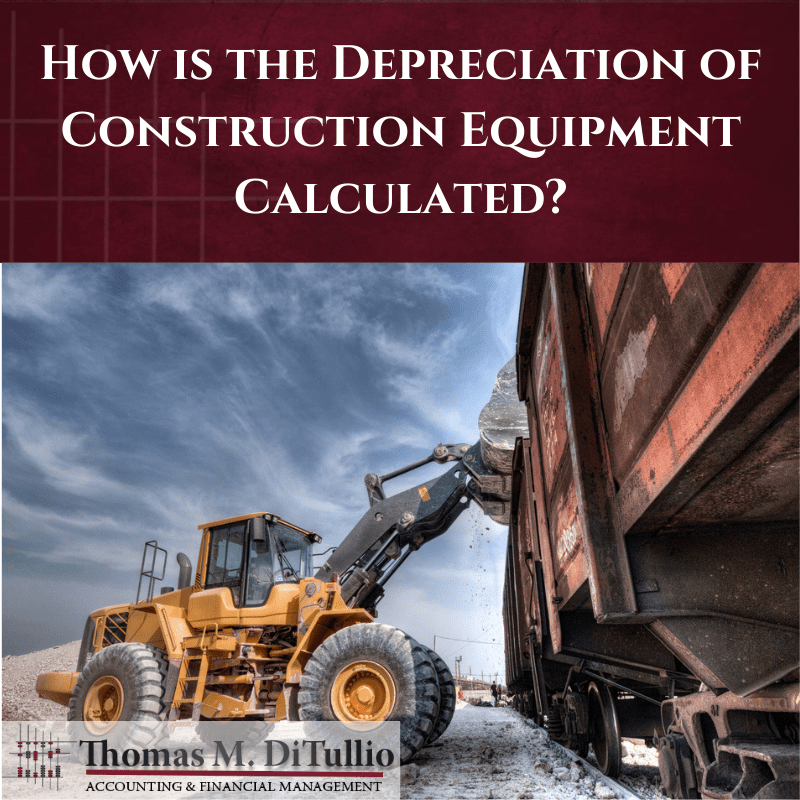How is the Depreciation of Construction Equipment Calculated?
When you think about depreciation, it sounds like a complicated business term. Once you understand how this term is essential for your construction company, you will come to appreciate depreciation. Construction equipment costs money. When equipment is sold, the price diminishes. Depreciation is the value deducted from the initial costs over the lifespan of the equipment. If you want to calibrate your equipment’s depreciation accurately, make sure to keep reading this article.
What Is Equipment Depreciation?
Equipment depreciation shows how much value your equipment loses on a yearly basis. Unfortunately, your equipment is worth less than when you first purchased it, no matter how much you maintain the asset.
With depreciation, you can tell how much value your asset loses over a period of time. Depreciation allows you to plan for maintenance. In some cases, it might not be a financially feasible decision to maintain the equipment when the asset loses much of its value. As the older equipment breaks down, it is often a wiser choice to purchase a newer model.
Along with that, depreciation can help with your taxes. You may be able to write off the equipment as a company expense, saving your business money. In some situations, you can choose to spread the costs over several years instead of making a one-time payment. With depreciation, you will need to determine the exact costs of your construction equipment to figure out its value.
What Information Is Needed To Calculate Depreciation?
Calculating depreciation is a straightforward process if you have all the required information. However, there are some criteria. You can only depreciate construction equipment that is expected to last for more than a year. Plus, this equipment must have a useful lifespan that you can put into a number. You must own these assets. Along with that, these assets must be used to help your construction company earn revenue. Any equipment that doesn’t meet all of those criteria cannot have its depreciation calculated. There are several methods to determine your construction depreciation.
Cost Value
If you want to know the value of your construction equipment, you need to know its purchasing price. The cost value is the value of the initial purchase price, including transportation, taxes, and set-up fees. Anything that your company purchases can be considered an asset of the business.
Before you can start depreciating equipment, you need to know how much you paid for it. You want to make sure you have receipts and other proof of purchases for your equipment. For example, if your construction equipment has a purchase price of $5,000, and there were additional costs, such as $400 in taxes and $400 in transportation costs, the total cost of the asset is now $5,800.
Salvage Value
With salvage value, that is an estimated sale amount for your asset. Mostly this value is calculated at the end of its useful life. In construction accounting, you can receive the amount after the typical useful life period of the equipment. If you want to calculate this value, you will need to use this formula:
Salvage value = cost value – (annual depreciation x useful life)
If you have construction equipment that you bought for $200,000, you can use the depreciated value at $18,000 for every year, adding up to a total of $180,000. According to the formula, you should be able to sell the equipment for $20,000 after 10 years. Remember that salvage value is just an estimate.
Book Value
Finally, the book value is the value of the construction equipment used for tax purposes and not the resale value. This value is determined by small business accounting services to find out the amount to write off for depreciation. You cannot calculate the book value of items that do not depreciate, such as money. If you want to calculate book value, use this formula:
Book value = cost value – (annual depreciation x age)
For example, if five years ago, you purchased construction equipment for $20,000, it will depreciate about $2,000 every year. With that, the book value would be $10,000. When you purchase the equipment, the book value is also known as the cost value. After a certain period of time, the book value might only equal the salvage value.
How To Calculate Depreciation for Construction Equipment
Now that you know about values, you can start to calculate depreciation. One accounting term is called “useful life” depreciation. This is how long the piece of equipment is expected to last before you need to replace it. You can measure the useful life in years. Even the IRS uses useful life values to determine how long the asset can be depreciated. The age of the equipment at the time of purchase, equipment usage patterns, and technological advances can affect the useful life of an asset.
Straight-line depreciation is calculated by dividing the cost of the construction equipment by the number of years for its estimated life. The construction equipment will depreciate equally over its useful lifespan with the straight-line depreciation model.
Finally, the declining balance depreciation method is based on an accelerated depreciation calculation. The cost of the equipment is not distributed over a period of time. Instead, the depreciation is determined early in the life of the equipment. The rate of depreciation will decrease over time. Equipment that is used more heavily during the early years of its lifespan will use the declining balance depreciation method.
Determining Depreciation Is Important
With equipment depreciation, you can write off the cost of the equipment over several years. Some methods allow you to determine depreciation at various rates. Figuring out depreciation can be challenging for many construction companies. With that in mind, you might want to let a small business accountant determine those sales for your construction company.
Let Us Help With Depreciation
At TMD Accounting, we have served the Gloucester County area for over 40 years. Our team has helped small businesses and individuals with their payroll, taxes, and other financial matters.
Need an accountant for my small business? Make sure to schedule a consultation by calling 1-856-228-2205.


